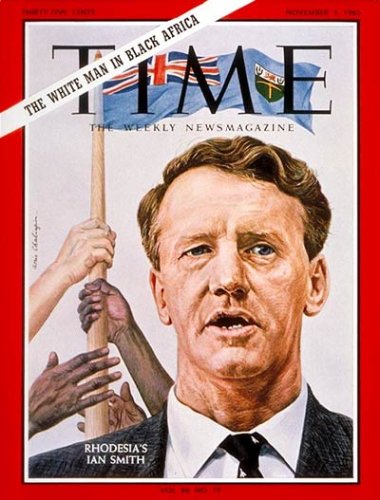
About Andrew Cusack
 Writer, web designer, etc.; born in New York; educated in Argentina, Scotland, and South Africa; now based in London.
Writer, web designer, etc.; born in New York; educated in Argentina, Scotland, and South Africa; now based in London. read more
News
Blogs
Reviews & Periodicals
Arts & Design
World
France
Mitteleuropa
Knickerbockers
Argentina
The Levant
Africa
Cape of Good Hope
Netherlands
Scandinavia
Québec
India
Muscovy
Germany
Academica
“We Live in Hope”
Ian Smith, the Grand Old Man of Africa, Speaks

Here is an interesting nine-minute-long clip from a documentary on Ian Smith, the former Prime Minister of Rhodesia, featuring the Hon. Mr. Smith himself, now eighty-eight years of age, as well as Kathy Olds, a landowner, and Ernest Mtunzi, a former aide to ZAPU leader Joshua Nkomo.
“What we believed in was responsible majority rule, as opposed to irresponsible majority rule and I stand by that,” Mr. Smith tells the interviewer. “I think it is important that before you give a person the vote you ensure that his roots go down, that he’s part of the whole structure of the country.”
“Smith is an African,” Ernest Mtunzi says. “He understands the African mentality. […] Smith was being realistic. If you give people something before they’re ready, they’re going to mess it up. And that has happened.”
“Africa is a continent which is subject to a great deal of friction and argument and change,” Smith concludes. “That’s part of the world generally but more so Africa than anywhere else. So because of that we live in hope. We think that the people they in the end will say we’ve had enough.”
“In the interest of our people and of other people this part of the world, let’s work together. […] Let’s just accept that we are all part of Africa, all part of the world. Let’s all work together and the more we can get people to accept that philosophy I think the greater the hope for the whole world.”

Search
Instagram: @andcusack
Click here for my Instagram photos.Most Recent Posts
- Bicycle Rack April 29, 2024
- Burns Tower April 19, 2024
- Patrick in Parliament March 18, 2024
- Articles of Note: 13 March 2024 March 13, 2024
- Cambridge March 9, 2024
Most Recent Comments
Book Wishlist
Monthly Archives
Categories



My relatives in Zimbabwe have, alas, finally thrown in the towel – and are leaving their farm and family home, and coming safe to Britain. A sad time, frankly, for them, though there have been many sad ones preceding it. Their country has been completely changed around them, to almost unbelievable degrees. They’re lucky to have their farm as it is, letalone their lives. Life there isn’t fun in the slightest.
Smith was right all along. Anyone who knew a smidgen of electoral history would have realised; as would the US administration attempting democracy in Iraq. Democracy is brilliant, but requires centuries, often, of development in infrastructure, culture and education, before a responsible citizenry exists to practice it.
Well said, CAWP.
I daresay the United States may need some more time (for development in “culture and education”) “before a responsible citizenry exists to practice it.”
That is, if we don’t do away with Democracy altogether — which is not in the least inconceivable if current trends continue.
It’s partly that you inherited such culture, education and models of infrastructure from Britain (the Founding Fathers and citizenry itself being largely British) that the USA was able to be both a successful democracy and a very young, wild country.
that the USA was able to be both a successful democracy and a very young, wild country.
Until that culture and model was devastated by the attacks of the modernists.
Many Americans like to think that our constitution was created ex nihilo by a gaggle of divinely-inspired enlightenment thinkers, forgetting that we in the United States have had the benefit of being at the receiving end of centuries of slow British constitutional development. We can probably attribute this to the fact that most public schools teach American history in a completely biased and ideological fashion. There is an irritating tendency to ignore or de-emphasize anything which can before the republican era in American history.
An excellent, excellent book on this subject, which I cannot recommend too strongly, is Russell Kirk’s America’s British Culture.
Andrew, I’m not sure I get the gist of your comment. What exactly do you mean by “attacks of the modernists”? Modernism was an international cultural movement that began after WWI. Are you saying that, until the end of WWI, America followed Britain as a cultural “model”?
I meant modernists in the general sense of “enemies of all that is good and holy” not in any of its specific senses such as the artistic movement called modernism or the heresy of modernism or architectural modernism, etc.
I could just as well have said multiculturalists, levellers, leftists, cultural revolutionaries, or whatnot, but I was averse to creating such a list.
Moreover, I would posit the notion that British schools teach British history in a “biased and ideological fashion” — as do schools in France, Denmark, all the way to India, etc, etc. — indeed, all countries teach their national history in pariotically biased and ideological fashion.
An oddly vague, even irrational response, Andrew. A surprise coming from you!
Actually, British schools don’t teach history at all!
I don’t see what is irrational about what I said; if anything, it is merely observational. Rather, it seems irrational to attempt to justify bias by citing how widespread it is.
Regarding the teaching of history, there is nothing which requires the teaching of American history in public schools to lean towards the various exceptionalist schools of thought (to name one of the more widespread biases in American education). What is most interesting, however, is how exceptionalism has continued despite the cultural revolution of the 1960s and onwards. In the beginning of the republican era, American exceptionalism was based upon the need to legitimize the illegitimate (ie: the revolution and its aftermath). Following that, exceptionalism continued along an American nationalistic line, legitimizing the expulsion of native tribes from their lands or the institution of slavery or massacres in the Phillipines. Then, finally, exceptionalism is transformed into a legitimation of liberalism, e.g. we must export democracy to the world or observe a slavish devotion to capitalist ways or we must destroy traditional “gender roles” because we are America and damn the consequences. So American exceptionalism has remained, but the nefarious ideas it has sought to defend have shifted. My personal theory is that this is a symptom of the New Englandization of America which took place over the 19th century; a theory which I would like to explore in greater detail at a later moment.
But nonetheless, while a completely objective history is probably impossible, I still believe that historians have a duty to aim for the greatest amount of objectivity possible. We should leave “patriotic” readings of history to the Norman Rockwell paintings and the D.A.R. essay contests. Real history should be about what happened.
Beautifully put, Andrew.
I much agree.
My reference to “irrational” had nothing to do with your concern about bias (indeed, it IS widespread, and, as I tried to point out, surely not limited to American schools alone), but with your response to my wondering what exactly you meant my “modernists.”
At any rate, I’d like to leave aside that subject for now, and say that I fully agree with your comments on American exceptionalism — & with your last sentence. Indeed, history should not be about patriotism, ideology, or indoctrination, but about what happened.
PS: Surprised to hear history is not taught in British schools! Interesting. It certainly is taught in Indian schools (and I had the impression they were modeled, to a great degree, after British schools.)
Thanks for the comments.
My comment was, of course, tongue-in-cheek, but it was not far wrong. Very little history is required in most British state schools.
I imagine that Indian schools are modelled on how British schools used to be, when British schools offered a quality education. As we shall see in the upcoming decades, this will be why India succeeds while Britain falters.
There are differing views about the quality of Indian education. The public schools are dominated by rote memorization and corporal punishment. Textbooks are badly written and out-of-date.
Private schools are much better, though they are usually boarding schools — excellent for older children, but (in my opinion) not always good for the very young. Overall, an Indian private school offers a far better education than most American schools, I daresay.
India is an extremely vast and complex country — talk about multiculturalism! During the course of single day, one feels as though having moved through multiple layers or strata of history.
For what it’s worth: Eclipse, an offshoot of Criterion, just came out with a DVD boxset of Louis Malle’s documentaries which includes his rarely seen 7 hour “Phantom India.” Filmed in 1968, it remains an astonishing, clear-eyed portrait — despite Malle’s leftist leanings and the passage of nearly forty years. It was reviled by India’s anglicized community for not focusing on economic achievements and the growing middle class — even though most of them never saw the film.
Dear Andrew,
Sorry for the sudden comment but I can’t help translating your article into Chinese.
There have been wide misunderstandings and ignorance about what really happened
to the Federation of Rhodesia and Nyasaland, whereas we live in the communist-controlled state of China, however I do not think it as “inevitable ignorance”.
Many apologies for not informing you, the author, in advance and I hereby add the link to this article’s translation.
http://www.douban.com/note/265993409/
If there are inappropriations please inform me and I shall remove the translation immediatly.